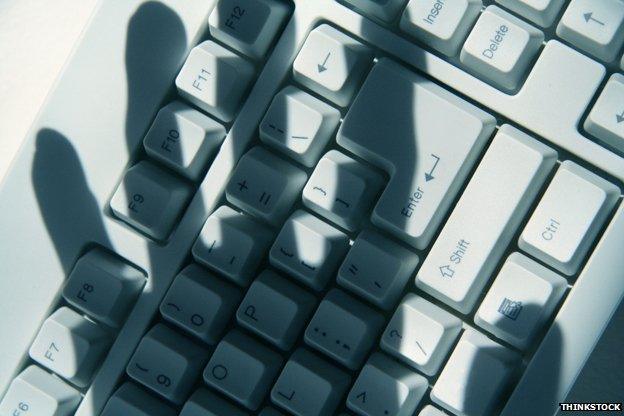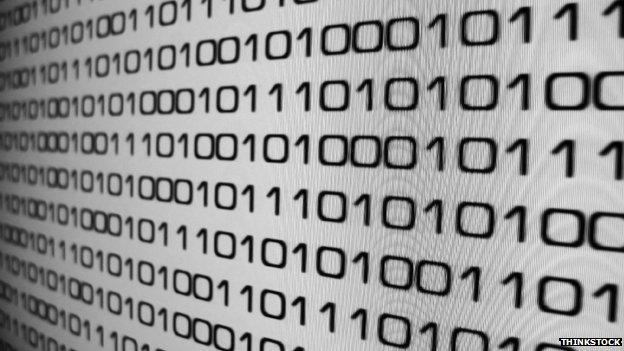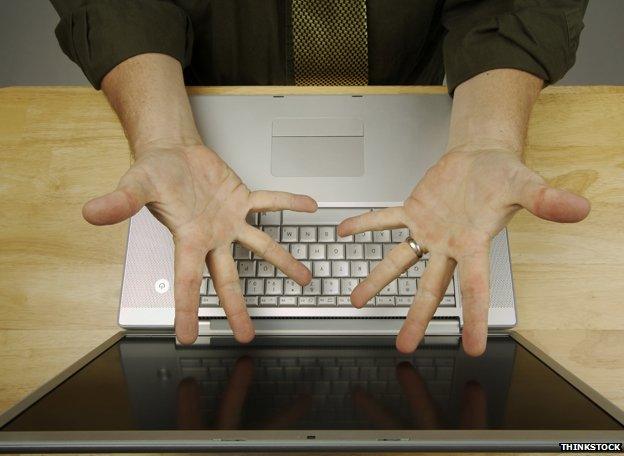A Point of View: Are humans too devoted to their own machines?
- Published

Just how frightened should people be about the dangers which lurk online, asks writer and performer AL Kennedy.
Over the last few weeks our media have been enjoying a classic technology scare story, involving shadowy white-hatted hackers, more shadowy black-hatted hackers and the possibility that the pricey electronic equipment lurking in our homes may not have our best interests at heart - as if we hadn't guessed.
Our tale involves botnets and ransomware Trojans. Allow me to explain, a bit. Botnets are wonderfully frightening. They're networks of computers, joined together like a powerful hive-mind in order to exchange information efficiently. Legal botnets do boringly useful things like keeping communications channels free. Illegal botnets typically involve tens of thousands of our own computers, recruited without our knowledge using viruses and serving distant and malign botmasters.
Secretly invasive Trojan software can mean that, every time we connect to the internet, we may be helping to crash a government's computers or sending strangers emails which comment on the size of their manhood. It's not bad enough that Windows 8 is as charming to use as a second-hand toothbrush and your all-in-one printer is giving you the orders. Your PC may also be sending your bank details to criminals, or participating in a denial of service attack (no, I don't really know what that means either) which could mean the FBI would like a chat.

About the author

AL Kennedy is a writer and performer
Her works include All The Rage, Everything You Need, and Day, which won the Costa Book of the Year in 2007
A Point of View is usually broadcast on Fridays on Radio 4 at 20:50 BST and repeated Sundays 08:50 BST

The former is more likely than the latter, but even so, the last thing we needed was an invading computer virus with a Bond movie name like Ransom Cryptolocker. This might send you an innocent email, perhaps pretending to be from your bank. It gets you to click on a link and immediately encrypts all the key files on your computer - documents, letters, photos of your kids. Then it sends you a scary message announcing you have to pay a ransom to retrieve your own files. And even if you pay the money, you may get nothing back. And Cryptolocker is dispersed by sometimes millions of infected computers. Where's 007 when we need him?
Viruses that ruin your day and make you pay to solve the problem they inflicted have been around for almost two decades, but the current scale of infections, the possible covert involvement of governments in cyber-sabotage and the current drive by the US Department of Justice, among others, to publicise their struggle with these online forces of darkness, have combined to give us a story which might even take our minds off all that football stuff that's going on somewhere and perhaps remind us to back up data, install antivirus software and not click on every emailed link we're sent.

Because I'm a novelist and therefore back up everything and am never without a data stick, even in the shower, the Cryptolocker scare - believed to have netted millions from victims worldwide - hasn't alarmed me unduly. It has set me thinking about all those allegedly smart appliances with which we are meant to fill our homes. When I was a child, someone had to walk across the living room to turn on our black-and-white television and one of three channels might be broadcasting. I can now recline and be drenched in available channels, live feeds of cats falling over, emails, tweets from outer space. It's now increasingly difficult to buy a phone, a car, an alarm clock that doesn't at least co-ordinate with Greenwich Mean Time and a GPS satellite. I can speak to the world. And although this is sort of wonderful, there are many "buts".
As more sophisticated computers become part of more appliances, the potential for virus infection increases. A household may end up with a tablet, a laptop, a PC, a couple of phones and e-readers, all working part-time for other masters. As people who know about computers tell me while snorting gently at my naivety, average users like me who just want to print pages and read emails don't bother to learn how to go online safely in a virtual world which can be hostile, confusing and strange. It's almost as if we feel we'd be intruding if we took charge of our expensive and complex servants. And some devices are currently unprotectable.

Computers are supposed to help us and yet, as has happened with every technological leap forward, humanity can end up serving its machines. Botnets aside, our devotion to computers raises issues. A significant body of research now identifies email as a major source of stress and online surfing as a factor in depression. We have access to a miraculous wealth of information 24 hours a day and it seems to be making many of us, at the very least, sad. But the truth may be more nuanced than that.
Workers bombarded by emails from stressful jobs may focus their compressed rage and inability to cope on their constantly nagging inbox. It becomes a symbol for wider despair in what may well be a dysfunctional workplace. Introducing computers to increase office efficiency may even have the reverse effect. When we hear of, say, a government department installing a new system to process this or that, we do kind of expect it to fail. It's hard enough to get a printer to communicate with a laptop - we understand compatibility issues.
We may overlook valuable exchanges of information which used to come from human contact - when people physically transferred material from desk to desk, department to department, chatting as they did so, checking up on other matters arising, holding an organisation together as a human concern. When computers are installed, information gathering can be impoverished and human exchanges can become as rigid and frustrating as a call centre option list.

Gameover Zeus and Random CryptoLocker

Gameover Zeus - aggressive malware which infects computers so it can be "taken over" remotely. It can be used for a number of different criminal activities such as viewing files, monitoring bank accounts, sending emails and even using webcam to spy on the computer owner
Random CryptoLocker - virus which criminals use which locks down PCs, and then issues ransom demand (with no guarantee that computer will be unlocked once ransom is paid)
Computers are usually affected through rogue emails (from friends or from banks, government or official source) containing attachments. When opened, these trigger download of malware or virus. Russian hacker, Evgeniy Bogachev (pictured) is wanted for questioning by US and UK crime agencies, external in connection with attacks
How to defend yourself against the "two-week attack" (BBC News Online), external

And at home, aggressively-planned obsolescence can mean we're forced into constant upgrades. Intrusive copyright protection can mean that we may not be permitted to use our own software and hardware as we'd like. If the sofa had been invented in the past decade I'd only be able to sit on it for a pre-paid year while wearing compatible trousers and with specifically identified guests.
Suppliers assume I'm not an innocent purchaser, but already guilty of piracy and mass dissemination. And I'm pre-emptively guilty in the opinion of who knows how many governments and agencies combing through my private correspondence and clogging their own arteries with irrelevant information, so that I am both intruded upon and less safe. And material I have produced may be exploited without my knowledge or consent, not just by hackers, but by all manner of social networks and storage options.
Prolonged surfing on social networks and news sites seems to increase depression - although that's surely not unconnected with the content on display. Because we've tumbled into the world wide web like mediaeval goat herds catapulted into Britain's Got Talent - we don't know what to do and lack advice - online we're in private but in public, pretending, real, lonely and exposed.
We may be offering information to a vast, invisible audience of predatory strangers and, cloaked by anonymity, we may be cruel as we'd never would in person. We demean, insult, threaten, offend, arouse and bemuse each other in a jungle cluttered with porn and more of those extremely entertaining cats. Simply absorbing the web's torrent of available disasters, losses and threats can be dispiriting. For vulnerable teenagers, online bullying can lead to self-harm and even suicide. Promising, attractive people who lost their futures because the world can now speak to them, but what it said was hateful.
As a child and lover of sci-fi I would have been thrilled to imagine today's technology. It can help us learn more, play more, work more flexibly, comfortably and ecologically. Potentially, it can allow us to communicate more easily and deeply with more people than ever before. The actuality of our brave new world - the online predators, information overloads and malign botmasters - that's still a work in progress, but give us time. Fresh forms of democracy and protest, a myriad of inspirations and supports - they're all out there, too.
Subscribe to the BBC News Magazine's email newsletter to get articles sent to your inbox.